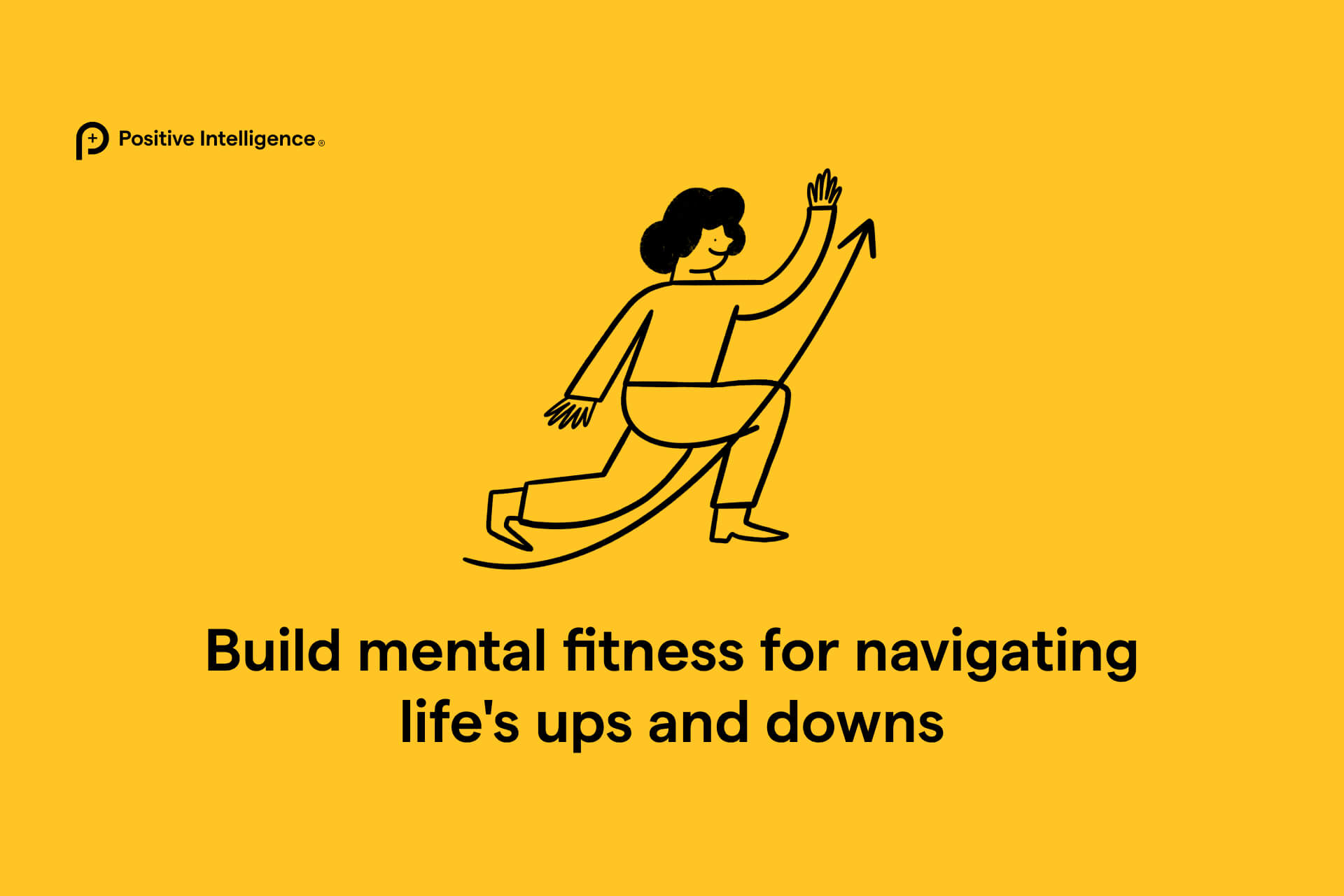
Individual
A self-facilitated program to boost your mental fitness for personal and professional growth
This website will offer limited functionality in this browser. We only support the recent versions of major browsers like Chrome, Firefox, Safari, and Edge.

Select the experience that fits your needs

A self-facilitated program to boost your mental fitness for personal and professional growth

A self-facilitated mental fitness program with exclusive pricing for 2 to 25 individuals

Explore coach-led mental fitness programs with workshops tailored to your organization
Mental Fitness

Setbacks are a part of life. A tough conversation or unexpected news can knock you off balance. But you can build resilience to recover quickly. And you can even turn setbacks into gifts and opportunities.
Resilience is about shifting from a negative mindset to a positive one. In Positive Intelligence® (PQ) terms, resilience means quickly moving from a Saboteur reaction to a wise Sage response. This ability has a deep impact on your well-being, performance, and relationships. Here’s why resilience matters and how you can rewire your brain for resilience at work and in daily life.
Imagine a tennis player missing a shot and getting upset. Now, imagine them missing the next shot because they are still distracted by the first mistake. In your work and life, it’s similar. A difficult email before a big meeting can put you in a negative headspace. This can affect your performance and your interactions during the meeting. This is because your Saboteurs become active, creating a negative contagion effect.
When you do not recover quickly from setbacks, they can snowball. One negative reaction can lead to another, affecting everything you do. This keeps you down and makes it harder to move forward.
Your Saboteurs — automatic mental patterns — are the main reason you don’t recover quickly from setbacks. Saboteurs, especially the Judge, keep you stuck in negative reactions. The Judge blames you, others, or the situation you’re in. It then calls in accomplices to keep you stuck in a negative cycle.
Here’s how the Saboteurs can keep you from bouncing back after a setback:
Judge: Blames you, others, or the situation for the setback. This causes self-doubt, anger, and helplessness. All three reactions make it harder for you to recover.
Avoider: Denies the setback or makes you put off dealing with it. This leads to anxiety and unresolved issues.
Controller: Tries to compensate by micromanaging small things. This causes frustration and distracts you from the real problem.
Hyper-Achiever: Sees setbacks as a threat to your self-worth. This leads to overreaction, stress, and anxiety.
Hyper-Rational: Withdraws into pure logic, missing the important emotional parts of the problem.
Hyper-Vigilant: Uses the setback to justify excessive worry, wasting your energy.
Pleaser: Becomes even more eager to please others, making it hard to set boundaries.
Restless: Avoids the setback by chasing new stimulation, so you never recover.
Stickler: Insists on perfection and order. This leads to frustration and anxiety when a setback disrupts your plans.
Victim: Activates a “poor me” narrative that prolongs your suffering.
To recover quickly from setbacks, you need your Sage — the wise part of your mind. You can use these powers to turn problems into opportunities.
When you face a setback, your Sage gives you two powerful choices:
1. Accept: Make peace with what happened and let it be. This means choosing not to dwell in negative emotions. It doesn’t mean denying the reality of the situation.
2. Convert: Actively use your Sage Powers to turn the setback into a gift. Perhaps your gift is a lesson you learned. Or it might be something new you created. It can even be tapping into a source of unexpected strength.
Your Sage has five powerful tools to help you respond to any challenge. By applying these powers, you can convert problems into opportunities.
Empathize: Have compassion for yourself and others. This recharges your mental and emotional energy. Empathize is especially important when the Judge is active.
Explore: Ask “what’s really going on here?” with deep curiosity and no blame. This helps you understand the situation fully before acting.
Innovate: Create new solutions or opportunities from the setback. This brings the joy of creativity to problem-solving.
Navigate: Choose a path forward that aligns with your deepest values and purpose. This provides clarity, especially during big challenges.
Activate: Take decisive action without Saboteur interference. This way, your energy is focused on producing the best results.
You can actively rewire your brain for faster recovery. Mental fitness practices build neural pathways that lead to lasting change.
Here’s how it works. Every setback increases your Saboteur intensity, making you feel hijacked when it overpowers your Sage. But consistent practice rewires your brain, shifting your baseline over time. This means your Sage intensity increases while your Saboteur intensity decreases.
You’ll be hijacked less often by negative reactions. This leads to fewer setbacks and a stronger, more resilient mind. By doing PQ Reps, especially in the morning, you charge up your PQ Brain. This intensifies your Sage and creates a positive spiral that lasts throughout the day.
Many traditional approaches to resilience involve pushing through discomfort. These approaches call for sheer willpower, often fueled by shame or guilt. But this is the Saboteur way, and it can lead to burnout. It’s like trying to bulldoze through a wall of resistance.
The Sage approach is different. Instead of pushing, it helps you dissolve resistance by shifting your perspective. Your Saboteurs created the wall of resistance in the first place. By quieting them, you take down the wall. You’re pulled forward by positive emotions like curiosity and inspiration, not driven by fear. This is a path to sustainable resilience without exhaustion.
Think of a joyful surfer. They don’t control the wind or the waves, but they become skilled at riding them. They don’t judge the falls. They simply see them as part of the game.
Life will always bring unpredictable waves and challenges. With mental fitness, you learn to surf them with curiosity, focus, and clear-headed action, no matter what comes your way. This perspective allows you to see the game of life as an opportunity for growth.
Building mental fitness transforms how you navigate challenges. And it leads to improvements in well-being, performance, and relationships.
Are you ready to explore how PQ can help you build lasting resilience? Take the free Saboteur Assessment to discover which inner critics might be limiting your potential.

